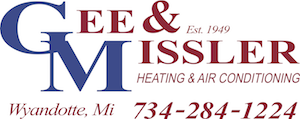Purchasing your first home is exciting. You’re likely trying to keep track of a dozen things or more to ensure you’re making the right choice. We believe that understanding your future HVAC system is crucial. The property’s HVAC system represents a substantial investment and source of potential long-term costs, so being thorough helps all first-time homebuyers.
In the following guide, we’ll share seven tips for discovering all there is to know about a home’s heating and cooling setup. And if you want a more in-depth opinion from the pros, feel free to call Gee & Missler Heating & Air Conditioning. Our staff can help you compare your options with industry insights that are second to none.
1. What HVAC System Are You Working With?
Start by determining what kind of HVAC system the home has. Furnaces tend to last longer than air conditioners, and relatively new types of HVAC systems like heat pumps can offer average life spans that are even longer. Knowing the make and specific model ensures you have a clear idea of how much it might cost in upkeep over time.
2. How Long Ago Was the System Installed?
Another good idea is to find out how old the HVAC system is when you’re looking at a potential new home. In general, HVAC systems tend to run for about 10-12 years. Learning its approximate installation date helps you anticipate future maintenance needs or when it might shut down for good. Older systems are more prone to problems, so fiscal planning for a replacement unit might be needed faster than expected.
3. What Does the Warranty Cover?
Don’t forget to look into whether the HVAC system is covered by a warranty. If it is, that’s great news because it can lower maintenance expenses. HVAC warranties should take care of parts and labor, but specifics will vary. Don’t forget to look into any terms you don’t recognize to ensure you understand your coverage and any possible out-of-pocket costs.
4. Has the System Ever Been Professionally Serviced or Maintained?
Next, examine the maintenance history of the HVAC system, if that information is available. This kind of information can reveal if there have been regular problems or how often maintenance is performed. Inquire about key tasks such as changing the air filter, which can indicate it received regularly scheduled tune-ups.
5. Are You Aware of the System’s Energy Efficiency Ratings?
Purchasing a home with a heating and cooling system with strong energy efficiency means more manageable utility bills and a smaller environmental impact. Check out the seasonal energy efficiency ratio (SEER) ratings for air conditioning along with the annual fuel utilization efficiency (AFUE) for furnaces. The higher the SEER rating, the more efficient the cooling over the whole season, while higher AFUE ratings indicate that the fuel is efficiently converted into useable heat.
6. Can You Spot Trouble After Your Own Inspection?
Even if you don’t have experience in HVAC systems, you can still take a moment to examine the HVAC system on your own. Keep an eye out for signs of problems that haven’t been mentioned by the seller. This can mean bizarre noises, stubborn patches of the house that are too hot or cold and attempts to hide any obvious damage.
7. Is an Experienced HVAC Technician Available to Help?
If you’re unsure about the overall state of the HVAC system, it’s wise to get an assessment and recommendation from certified HVAC technicians. They will be much more likely to catch things you may not know about, including leaking coolant, bad electrical connections or flawed ductwork.
A Consultation with Gee & Missler Heating & Air Conditioning Helps Take the Stress Out of Your Home-Buying Journey
Choosing your first home should be thrilling, and Gee & Missler Heating & Air Conditioning can ensure it stays that way. Get in touch with us at 734-284-1224. We can talk about how our HVAC services help make this process smoother, giving you what you need to make an offer with confidence.


